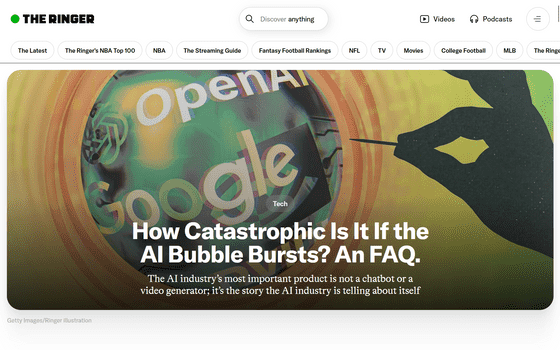How devastating will the AI bubble be if it bursts?

Driven by AI development, the stock prices of Microsoft and Apple have skyrocketed. NVIDIA, which provides GPUs essential for AI development, became the first company in the world to
How Catastrophic Is It If the AI Bubble Bursts? An FAQ. - The Ringer
https://www.theringer.com/2025/11/04/tech/ai-bubble-burst-popping-explained-collapse-or-not-chatgpt

Phillips points out, 'AI companies are wasting huge amounts of money without seeing a path to profitability, and the purpose of their products is unclear. Many products are malfunctioning: AI search engines return inaccurate information, AI teachers hinder learning, and AI therapists worsen mental health. Yet investors continue to pour money into AI because of excessive expectations, and stock prices are soaring. A bubble is a state in which the amount people are willing to pay for something exceeds the value of that thing to a significantly unsustainable level. For this reason, we can say that AI is currently in a bubble.'
For example, suppose a pair of hard-to-find sneakers, which cost 2,000 yen to manufacture and retail for 10,000 yen, is being sold on an auction site for 200,000 yen. Even if everyone feels that 200,000 yen is too expensive for sneakers, if there are still people willing to buy them, the price will rise, and the sneakers will sell for more than 200,000 yen. However, if one person becomes worried and sells 10 pairs of sneakers for a price slightly lower than the highest price, people who think that the price will fall will start selling their own sneakers, and the sneakers will lose value, and they will only be sold for 20,000 yen at auction. This is what we call a 'bubble' and a 'bubble burst.'
The reason prices continued to rise to unreasonable levels was because people convinced themselves that it was reasonable to pay that amount, which is an illusion. Therefore, when people decided to get rid of them before anyone else realized it was unreasonable, the prices plummeted.

The same is true for stock prices, which are strongly influenced by investor psychology. Even rational indicators that are worthy of predicting stock prices, such as what AI companies are actually producing and how sophisticated chat AI and video generation AI have become, can sometimes be no match for investor psychology.
One of the problems with AI is that people often misunderstand the value that AI products actually create. For example, OpenAI's chatbot, ChatGPT, is the most successful generative AI product to date, but it requires so much expensive computing power to run that it almost always incurs a loss every time it is used.
AI has also put strain on the power grid and driven up household electricity bills. AI companies are pouring money into so-called 'computing'—the processing power used to train AI models and execute search queries—into increasingly bizarre and opaque circular transactions. For example, NVIDIA invested billions of dollars in OpenAI, which then used the funds to buy NVIDIA products. 'OpenAI's proposed trillion-dollar IPO is not a reflection of the strength of its business, but rather the story it's telling,' Phillips said.

Concerns about the AI bubble are growing at the time of writing, with Michael Burry, the inspiration behind the film ' The Big Short, ' betting $1.1 billion on a collapse in the stock prices of Nvidia and software company Palantir. Phillips predicts that a collapse of the AI bubble will have a devastating impact on companies using generative AI and technology companies related to AI development, resulting in tens of thousands of job losses, evaporating investment capital, and ruining the lives of everyone except the wealthy elite.
Related Posts:







